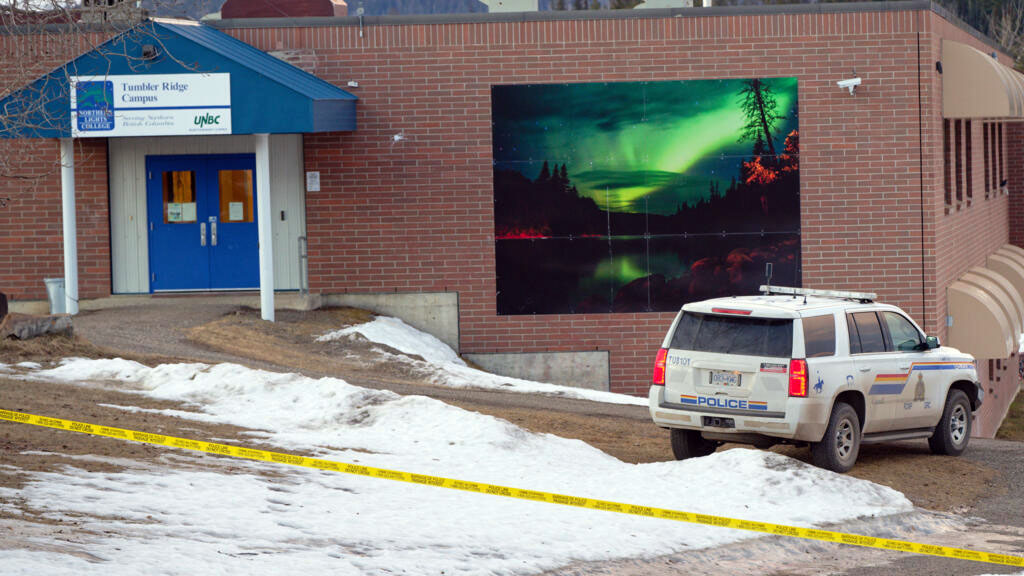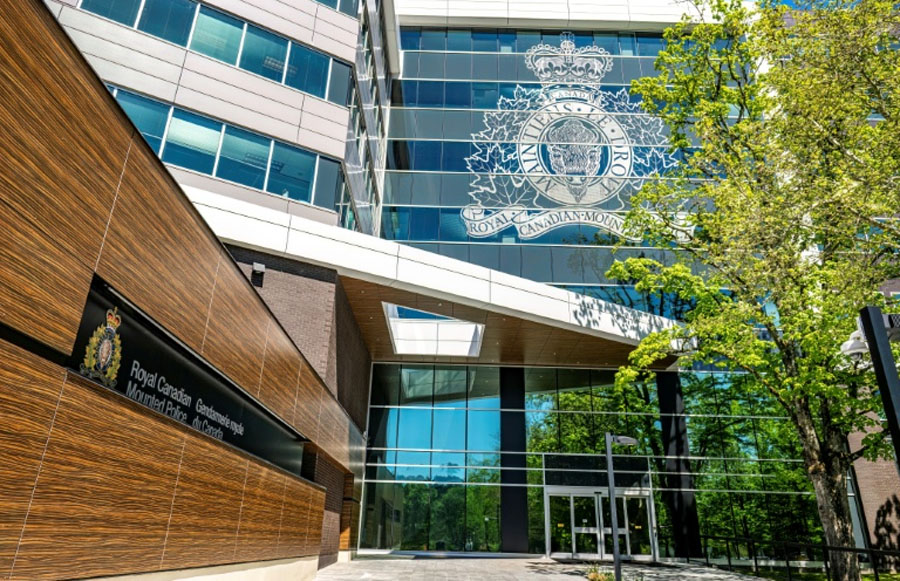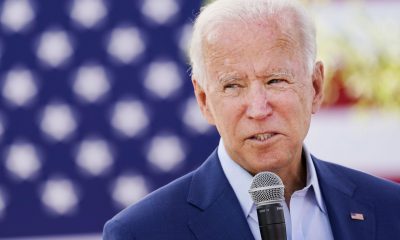International
Kyiv ‘ready to fight’ as Russian forces close in on Ukraine capital

Ukrainian officials have said Kyiv is “ready to fight” as Russian forces renewed their bombardment on the capital and observers warned of “an unimaginable tragedy” unfolding after more than two weeks of war.
Air raid sirens and shelling rang out over Kyiv and other major Ukrainian cities on Saturday morning amid warnings from western defence officials that the Russians were beginning to gain ground around the capital.
There were reports of loud explosions in Dnipro in the country’s east on Saturday, as well as Mykolaiv, Nikolaev and Kropyvnytskyi.
But Ukrainian presidential adviser Mykhailo Podolyak said the capital was “ready to fight”. He called it a “city under siege”, with checkpoints prepared and supply lines in place. “Kyiv will stand until the end.”
Satellite imagery from Maxar Technologies on Saturday has shown homes and buildings on fire and Russian artillery battalions appearing to fire on towns surrounding to the north-west of the Ukrainian capital as forces advance. The Guardian has not independently verified the images.
A senior US defence official said at a Pentagon briefing on Friday: “We do assess that the Russians are beginning to make more momentum on the ground towards Kyiv, particularly from the east.”
The UK Ministry of Defence said on Saturday morning that “the bulk of Russian ground forces” were around 25km from the centre of Kyiv, while the cities of Kharkiv, Chernihiv, Sumy and Mariupol remain encircled and continued to suffer heavy Russian shelling.
However, the Institute for the Study of War, a US thinktank, said that Russian operations around Kyiv “remained largely stalled over the past 24 hours” to “resupply and refit frontline units” – an assessment shared by Ukrainian presidential adviser Oleksiy Arestovych, who said on Friday that the Russian advance had been halted over the past day.
READ ALSO:
- Malami makes a U-turn, says no evidence Kyari laundered money
- AGF Malami orders DSS to hands-off Sowore’s trial, takes over case-file
- APC dares INEC, says March 26 convention will hold
Volodymyr Zelenskiy has called on Ukrainians to continue fighting, but said living conditions in the Kyiv region had deteriorated into a “humanitarian catastrophe” with disrupted gas, heating and water. The Ukrainian president said his country had reached a “strategic turning point” in the conflict. “It is impossible to say how many days we still have [ahead of us] to free Ukrainian land. But we can say we will do it,” he said. “We are already moving towards our goal, our victory.”
About 2 million people – half the population of the metropolitan area – had left the capital, the Kyiv mayor, Vitali Klitschko, said on Friday, and those who remained continued to prepare for its defence.
“Every street, every house is being fortified,” he said. “Even people who in their lives never intended to change their clothes, now they are in uniform with machine guns in their hands.”
Ukrainian soldiers described fierce fighting for control of the main highway leading into the capital, while missile strikes were reported hitting just outside Kyiv’s city limits on Friday.
“It’s frightening, but what can you do?” said Vasil Popov, a 38-year-old who works in advertising sales. “There is nowhere to really run or hide. We live here.”
Continuing Russian bombardments and attacks on civilians in cities across Ukraine have prompted warnings of “an unimaginable tragedy” and a new flurry of alarm from the UN that Russia is committing war crimes.
“We are really heading towards an unimaginable tragedy,” Stephen Cornish of Doctors Without Borders told Agence France-Presse, insisting “there is still time to avoid it, and we must see it avoided”.
Hundreds of thousands of civilians remain trapped and under fire in Ukrainian cities, but the situation in Mariupol is especially dire. Ten days into Russia’s siege, its population has no access to electricity or mobile phone networks, and water and food are running out. On Friday 7,144 people were evacuated from four Ukrainian cities, Zelenskiy said in a televised address – a much lower number than managed to leave in each of the two previous days.
Zelenskiy accused Russia of refusing to allow people out of Mariupol and said Ukraine would try again to deliver food and medicines there on Saturday.
READ ALSO:
- Lagos Assembly wants state parking authority to replace NURTW
- Rivers Donates 14 Gunboats to Military to Tackle Sea Piracy, Illegal Bunkering
- Acura set for Integra rollout, next generation compact sport car
Ukraine has repeatedly raised concerns that Moscow’s ally Belarus, which has served as a staging point for Russian forces, will soon have its troops drawn into the invasion. Ukraine’s state centre for strategic communications said Belarus might launch an invasion of Ukraine today, after a meeting in Moscow between the Russian president, Vladimir Putin, and the Belarusian leader, Alexander Lukashenko. Ukraine accused Russia of staging “false flag” air attacks on Belarus from Ukraine to provide an excuse for an offensive.
Putin and Lukashenko agreed on Friday that Moscow would supply its smaller neighbour with military equipment and mutual support against western sanctions, including on energy prices, the official Belarus state news agency BelTA said.
Foreign combatants have already entered the Ukrainian conflict on both sides, but the Kremlin has ramped up efforts to bring in reinforcements from Syria. Syria’s military has begun recruiting troops from its own ranks to fight alongside Russian forces in Ukraine, promising payments of $3,000 a month – a sum of up to 50 times more than a Syrian soldier’s monthly salary. A furious Zelenskiy accused Russia of hiring “murderers from Syria, a country where everything has been destroyed … like they are doing here to us”.
As the war continues, Russia faces an expanding net of sanctions. Western governments have announced plans to impose punitive tariffs on Russian trade to further isolate Moscow from the global economy. The G7 group of wealthy nations said it would strip Russia of “most favoured nation” status under World Trade Organization rules. The US president, Joe Biden, announced plans to ban the import of seafood, vodka and diamonds from Russia, and the UK government says it is planning to ban exports of luxury goods to Russia.
Deutsche Bank and Sony Pictures have joined the exodus of western businesses from Russia. In a statement posted on its website, Deutsche Bank said it was “in the process of winding down our remaining business in Russia” and that there “won’t be any new business in Russia”. Russia has moved to block Instagram after its parent company, Meta, said it would allow calls for violence against Putin and Russian soldiers involved in the invasion of Ukraine to appear on the social media platform. Russian prosecutors demanded that access to Instagram be blocked, and authorities moved to recognise Meta as an “extremist organisation”.
The US has also imposed sanctions on a group of Russia’s elite, including billionaire Viktor Vekselberg, three family members of Putin’s spokesman and members of parliament.
THE GUARDIAN
With Agence France-Presse
International
Russia Escalates Digital Control with Attempted WhatsApp Block

Russia Escalates Digital Control with Attempted WhatsApp Block
WhatsApp has accused the Russian government of trying to completely block its messaging service in the country, a move aimed at steering users toward the state-backed app MAX. The Meta-owned platform said the effort, reported on February 12, 2026, threatens over 100 million users and undermines private, encrypted communication in Russia.
In a statement, WhatsApp said: “Today the Russian government attempted to fully block WhatsApp in an effort to drive people to a state-owned surveillance app. Trying to isolate over 100 million users from private and secure communication … can only lead to less safety for people in Russia. We continue to do everything we can to keep users connected.”
READ ALSO:
- Tumbler Ridge Massacre: Canada Investigates Shooter’s Mental Health, Police History
- Ex-Acting AGF Nwabuoku Admits Diverting N868.4 Million to Private Firms
- Kwankwasiyya Urges US Congress to Drop Kwankwaso’s Name from Bill
The attempt is part of a broader crackdown on foreign tech platforms in Russia. Authorities have previously restricted access to Facebook, Instagram, and targeted other services like Telegram. Reports indicate that Roskomnadzor, Russia’s communications regulator, removed WhatsApp from its national internet directory, forcing users to rely on VPNs to access the platform. Critics warn that such measures are designed to expand state surveillance and control over digital communication.
The government is actively promoting MAX, a domestic “super-app” similar to China’s WeChat, which combines messaging with other services. Rights advocates caution that the push toward MAX could compromise privacy protections that platforms like WhatsApp provide. Meanwhile, Kremlin officials have indicated that WhatsApp and other restricted apps could be restored if Meta complies with local data storage and regulatory laws.
WhatsApp’s statement emphasizes that the company will continue to work to keep its service accessible where possible, but the attempted block highlights Russia’s ongoing effort to enforce digital sovereignty and shift users toward state-controlled technology platforms.
Russia Escalates Digital Control with Attempted WhatsApp Block
International
Tumbler Ridge Massacre: Canada Investigates Shooter’s Mental Health, Police History

Tumbler Ridge Massacre: Canada Investigates Shooter’s Mental Health, Police History
Canadian authorities are intensifying investigations into the mental health history and prior police interactions of Jesse Van Rootselaar, the 18-year-old who carried out a deadly mass shooting in the remote mining town of Tumbler Ridge, British Columbia, on February 10, 2026. The tragedy has left the small community in mourning and raised national questions about gun control, mental health support, and law enforcement interventions.
According to RCMP Deputy Commissioner Dwayne McDonald, authorities are still unclear on the motive behind the attack, which is one of the deadliest school shootings in Canadian history. Van Rootselaar, a transgender woman who had dropped out of Tumbler Ridge Secondary School four years ago, first killed her mother and stepbrother before opening fire at the school, where she shot six more victims. The shooter later took her own life at the scene.
Investigators have confirmed that Van Rootselaar was known to police and had previous interactions with the public health system due to mental health concerns. Authorities are reviewing prior incidents, including earlier firearms seizures and her lapsed gun licence, to understand how warning signs were addressed before the massacre. British Columbia Premier David Eby said officials are working with the health system to determine “what interactions may have taken place” in the past.
READ ALSO:
- Ex-Acting AGF Nwabuoku Admits Diverting N868.4 Million to Private Firms
- Kwankwasiyya Urges US Congress to Drop Kwankwaso’s Name from Bill
- Liverpool Edge Sunderland 1-0 to Halt Impressive Home Streak
The victims include a 39-year-old female teacher and five students aged 12 and 13, with one child, 12-year-old Maya Gebala, in critical condition after trying to lock herself and classmates in a library during the attack. First responders arrived within minutes, but the scale of the violence left the tight-knit community of about 2,700 residents reeling. Hundreds gathered for a candlelight vigil to honour those killed and injured.
Prime Minister Mark Carney addressed parliament, describing Tumbler Ridge as a resilient, compassionate community of miners, teachers, and construction workers, and emphasised the need to learn from the tragedy. Flags across Canada have been lowered to half-staff for seven days in remembrance of the victims. Britain’s King Charles and Queen Camilla also expressed shock and sorrow over the massacre.
Schools in the area will remain closed for the remainder of the week as authorities continue their investigation into Van Rootselaar’s mental health background, police interactions, and access to firearms, seeking to understand how similar tragedies can be prevented in the future.
Tumbler Ridge Massacre: Canada Investigates Shooter’s Mental Health, Police History
International
Canada Mass Shooting: Nine Dead in School, Residence Attack

Canada Mass Shooting: Nine Dead in School, Residence Attack
A mass shooting in Tumbler Ridge, British Columbia, Canada has left nine people dead and dozens injured after an attacker opened fire at a secondary school and a nearby residence on Tuesday, February 10, 2026.
According to the Royal Canadian Mounted Police (RCMP), seven victims were killed at Tumbler Ridge Secondary School, while two others died at a residence connected to the incident. At least 27 people were wounded, including two in critical condition, while the rest sustained non-life-threatening injuries.
The suspect was found deceased at the scene from an apparent self-inflicted injury. Authorities have not yet released the identity or motive behind the attack, which has shaken the small community of roughly 2,400 residents.
READ ALSO:
- Police Arrest Suspect as Youth Suffers Head Injury in Vigilante Custody
- Boko Haram Seizes Four Trailers, Rustles Over 100 Cows in Borno
- Wike Backs Tinubu’s Peace Efforts, Vows Stability in Rivers
Police responded rapidly, issuing an active shooter alert, placing schools on lockdown, and evacuating students safely. The RCMP and local officials continue to investigate the circumstances surrounding the attack and the suspect’s background.
Local leaders described the event as a devastating tragedy, expressing solidarity with victims’ families. The shooting has prompted national attention in Canada and renewed calls for enhanced school security and measures to prevent mass shootings.
Authorities have urged the public to remain vigilant and report any suspicious activity, emphasizing the importance of community cooperation in maintaining safety and preventing similar tragedies.
The attack is considered one of the deadliest school-related shootings in Canada in recent years, drawing widespread condemnation and grief across the country.
Canada Mass Shooting: Nine Dead in School, Residence Attack
-

 metro2 days ago
metro2 days agoLeadership Crisis at NAHCON as Chairman Abdullahi Saleh Usman Resigns
-

 News2 days ago
News2 days agoOyo Muslims Reaffirm Loyalty to Sultan on Islamic Matters — Grand Chief Imam
-

 News2 days ago
News2 days agoUS Judge Orders FBI, DEA to Release Tinubu’s Criminal Records, Faults Delays
-

 International2 days ago
International2 days agoUS to Deport 18 More Nigerians on ‘Worst-of-the-Worst’ Criminal List (Full Names)
-

 metro2 days ago
metro2 days agoFormer NAHCON Chief Explains Why He Stepped Down, Denies Conflicts
-

 Business2 days ago
Business2 days agoNaira Posts Strong Comeback, Breaking Two‑Year High Against Dollar
-

 Business3 days ago
Business3 days agoCAC Deploys AI, Partners Google to Tackle Rising Business Registration Demand
-

 metro3 days ago
metro3 days agoCourt of Appeal Affirms Senate’s Power to Suspend Natasha Akpoti















